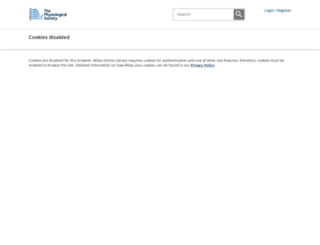Error - Cookies Turned Off
Page Load Speed
2.6 sec in total
First Response
52 ms
Resources Loaded
2.4 sec
Page Rendered
108 ms

About Website
Visit journals.physoc.org now to see the best up-to-date Journals Physoc content for United States and also check out these interesting facts you probably never knew about journals.physoc.org
The Journal of PhysiologyJournal homepageAuthor guidelinesSubmit a manuscript
Visit journals.physoc.orgKey Findings
We analyzed Journals.physoc.org page load time and found that the first response time was 52 ms and then it took 2.5 sec to load all DOM resources and completely render a web page. This is quite a good result, as only 45% of websites can load faster.